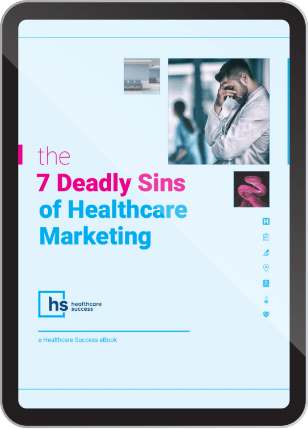Learning Search Engine Optimization: Elementary Lessons for Doctors
 [Part of a continuing education series.] Simply mention learning Search Engine Optimization (SEO) and more than a few professionals will roll their eyes upwards. Virtually all marketing-smart individuals truly appreciate the vital importance of SEO. But they also know that it’s a specialized skill set and vocabulary that they would rather leave to the tech-smart people.
[Part of a continuing education series.] Simply mention learning Search Engine Optimization (SEO) and more than a few professionals will roll their eyes upwards. Virtually all marketing-smart individuals truly appreciate the vital importance of SEO. But they also know that it’s a specialized skill set and vocabulary that they would rather leave to the tech-smart people.
There are the advertising and marketing strategy and planning brains…or the talented writers and artists. Perhaps these are the right-brain folks where creativity resides…versus the analytical left-brain crowd. It turns out that mastering SEO requires both left- and right-brain matter.
Learning Search Engine Optimization and the path to SERP…
For the otherwise uninitiated, and anyone who wants a better understanding, here’s a foundation for learning Search Engine Optimization.
The top-view definition of SEO—Search Engine Optimization—is the on-screen and off-screen strategies and techniques that give a website its greatest visibility with search engines, and thereby enhancing the search results page ranking and increasing the number of site visitors. In it’s simplest form, will your website match up to the word or phrase that the Internet visitor is using?
The results page of a search engine (SERP)—Google, Bing, Yahoo and others—opens the door to a bigger audience. And regardless of the defining terms you use, keep in mind that SEO is constantly evolving. Keeping a web presence current, and high among SERP results is an ongoing process.
To make things more of a mystery, search engines (Google being the largest) do not reveal all of their algorithm particulars. But they do provide enough help and a general picture of what works and what does not work, that many tips and good practices emerge. In spite of the secret overlay, Google wants the system to work. They want to be the tool of choice to deliver accurate, authoritative and meaningful results to the Internet visitor.
The difference between On-page and Off-page SEO…
“On-page optimization (AKA on-page SEO) refers to all measures that can be taken directly within the website in order to improve its position in the search rankings. Examples of this include improving the content or the meta description and title tags.” [Searchmetrics] Influencing the natural search results/ranking is part art and part science, touching many factors that are controllable on the page such as keyword selection, placement and density.
Off-page SEO (or offpage optimization) is also intended to improve site ranking in the search engine results page (SERPs), but the influence factors can be more difficult or elusive. These are the techniques that are outside of the website that can enhance its position in search rankings such as having quality inbound links. “These factors are not controlled by the coding or words on your page. Examples of off-page optimization include things such as link popularity and page rank.” [Webopedia]
Finding Help: SEO resources and reference pages…
Right up front, Google declares that they will not reveal any of their SEO secrets that automatically rank your website. If they did, of course, everyone would expect to claim the top position. Nevertheless, to keep everyone in the grand game, there’s plenty of help available.
- Google’s SEO Starter Guide is easy to follow, and (mostly) not-too-technical PDF booklet to demystify SEO and how search engines crawl, index and understand your content.
- Google Webmaster Guidelines is a bit more advanced with direction and recommendations about what to do and what not to do in creating web pages. Quality means avoiding the deceptive or manipulative behavior that might lead to being removed from the Google index.
- Bing Webmaster Tools provide similar SEO insights with sections for guidelines, help center, support and regular blog articles.
Just ask; we’re here to help…
There’s no shortage of SEO help, guides and online resources. In fact, the proliferation of helpful info can be TMI (too much information) for some people. Regardless of your skill level, you’re welcome to dive in and fine-tune your web pages.
Moreover, Healthcare Success can help. Reach out to us today, and ask about our free website SEO audit, including all-important mobile friendliness.








